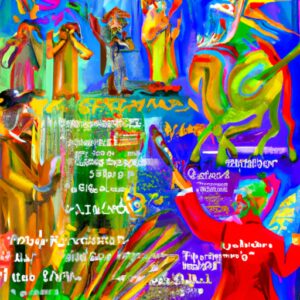Get ready to be surprised by how much Italian has influenced the English language! From food to fashion, art to music, Italian loanwords are all around us.
In this article, we’ll reveal some of the most interesting and unexpected words you didn’t know were borrowed from Italian. Prepare to be inspired by the linguistic richness of our world!
What are Italian loanwords?
Italian is a beautiful language known for its melodious tones, rich culture, and delicious cuisine. It’s no wonder that it has influenced many other languages around the world, including English.
In fact, there are numerous words in the English language that have their origins in Italian. Some of them are so common that you may not even realize they are borrowed from Italian.
From everyday words like “banana” and “pasta” to more obscure words like “soprano” and “fiasco,” the Italian language has left its mark on the English language in countless ways.
In this article, we’ll explore some of the most interesting and unexpected words that have been borrowed from Italian, giving you a new appreciation for the language and its impact on the world.
Whether you’re a lover of language, a curious learner, or someone who enjoys discovering new words, you won’t want to miss this fascinating journey into the Italian roots of the English language.
Common Italian loanwords in the English language
Italian is a Romance language that has contributed many words to the English language over the years.
Some of these words are so common that you might not even realize they have Italian roots.
For example, the word “banana” comes from the Italian word “banano,” which originally came from the Wolof language of West Africa.
Other common Italian loanwords in the English language include:
- Pasta – This Italian word for “dough” has come to refer specifically to Italian-style noodles made from wheat flour and water.
- Pizza – This delicious Italian dish of flatbread topped with tomato sauce, cheese, and various toppings is now popular all over the world.
- Gelato – This Italian dessert is similar to ice cream but is made with milk instead of cream and has less air whipped into it, resulting in a denser texture.
- Cappuccino – This Italian coffee drink is made with espresso, steamed milk, and a layer of frothed milk on top.
- Al dente – This Italian phrase means “to the tooth” and refers to pasta that is cooked just enough to be firm but not hard.
- Fresco – This Italian word means “fresh” and is often used to describe a style of painting done on wet plaster.
These are just a few examples of the many Italian loanwords that have become part of the English language.
It’s fascinating to consider how these words have traveled through time and across borders to become so familiar to us today.
Words related to food and drink borrowed from Italian.
Italian cuisine is known and loved around the world for its delicious flavors and fresh ingredients.
It’s no surprise, then, that many words related to food and drink have been borrowed from Italian into English.
Here are a few examples:
- Antipasto – This Italian word means “before the meal” and refers to a selection of appetizers served before the main course.
- Bruschetta – This Italian dish consists of grilled bread topped with garlic, olive oil, and various toppings such as tomatoes, basil, and mozzarella cheese.
- Calzone – This Italian dish is similar to a pizza, but the toppings are folded inside the dough before it is baked.
- Caprese – This Italian salad features sliced tomatoes, mozzarella cheese, and basil drizzled with olive oil and balsamic vinegar.
- Espresso – This Italian coffee drink is made by forcing hot water through finely-ground coffee beans under high pressure.
- Gnocchi – These Italian dumplings are made from mashed potatoes, flour, and egg and are often served with tomato sauce or pesto.
Italian cuisine has had a huge influence on the world of food, and these Italian loanwords are just a small example of how that influence has spread to other languages.
Italian loanwords used in music
Italian has also had a significant impact on the world of music, particularly in classical music.
Many musical terms and expressions that are used today have their origins in Italian.
Here are a few examples:
- Allegro – This Italian word means “fast” and is used to indicate a quick or lively tempo in music.
- Crescendo – This Italian word means “growing” and is used to indicate a gradual increase in volume or intensity in music.
- Fortissimo – This Italian word means “very loud” and is used to indicate a very strong or forceful volume in music.
- Soprano – This Italian word refers to the highest female singing voice in opera and other forms of classical music.
- Tempo – This Italian word means “time” and is used to indicate the speed at which a piece of music should be played.
These are just a few examples of the many musical terms that have their origins in Italian. It’s fascinating to consider how these words have become so integral to the language of music.
Italian words in art and fashion
Italian has also had a significant influence on the worlds of art and fashion. Many Italian words are used to describe specific styles or techniques in both art and fashion, and many Italian designers and artists are well-known around the world.
Here are a few examples of Italian loanwords in art and fashion:
- Fresco – This Italian word refers to a style of painting done on wet plaster, which results in a durable and long-lasting mural.
- Renaissance – This Italian word means “rebirth” and refers to a period of artistic and cultural revival that took place in Europe from the 14th to the 17th century.
- Silhouette – This French word comes from the Italian word “siluette,” which refers to a portrait or other image in profile.
- Stiletto – This Italian word refers to a type of high-heeled shoe with a long, thin heel.
- Vespa – This Italian word means “wasp” and refers to a style of motor scooter that was first manufactured in Italy in the 1940s.
Italian has had a huge impact on the worlds of art and fashion, and these loanwords are just a small example of how that influence has been felt.
Italian words used in sports
Finally, Italian loanwords have also made their way into the world of sports.
Here are a few examples:
- Giro – This Italian word means “tour” and is used to describe a long-distance bicycle race that takes place in Italy.
- Paparazzi – This Italian word refers to freelance photographers who take pictures of celebrities and other public figures, often in an intrusive or aggressive manner.
- Piazza – This Italian word means “square” and is used to describe the central area of a town or city.
- Slalom – This Italian word refers to a skiing race that involves weaving in and out of a series of gates.
- Volley – This Italian word means “flight” and is used to describe a type of shot in which a ball is hit before it touches the ground.
These are just a few examples of the many Italian loanwords that have made their way into the world of sports.
Italian words in everyday conversation
Italian loanwords are not just limited to specific areas of culture or language. In fact, many Italian words have become so common in English that we use them in everyday conversation without even realizing their origins.
Here are a few examples:
- Bella – This Italian word means “beautiful” and is often used as a term of endearment.
- Ciao – This Italian word means “hello” or “goodbye” and is often used informally to greet friends or family.
- Fiasco – This Italian word means “failure” or “disaster” and is often used to describe a situation that has gone wrong.
- Gusto – This Italian word means “taste” or “flavor” and is often used to describe food or drink.
- Mafia – This Italian word refers to a criminal organization that originated in Italy but has since spread to other parts of the world.
These are just a few examples of how Italian loanwords have become integrated into our everyday language and conversation.
The Impact of Italian on the English Language
Italian has had a profound impact on the English language, both in terms of vocabulary and culture.
Italian loanwords have enriched the English language and given us new ways of expressing ourselves.
They have also introduced us to new ideas, foods, and cultural practices.
Italian culture has had a major influence on the world of art, music, fashion, and cuisine, and its influence can be seen in many aspects of our daily lives.
Other languages with Italian loanwords
Italian is not the only language that has contributed loanwords to the English language.
Many other languages, including French, Spanish, and German, have also left their mark on English vocabulary and culture.
In fact, English is known for its ability to borrow words and phrases from other languages, making it a rich and diverse language that reflects the global nature of our world.
Final thoughts
Italian loanwords have played an important role in the development of the English language, enriching it with new words, ideas, and cultural practices.
From everyday words like “pasta” and “pizza” to more obscure words like “soprano” and “fresco,” Italian has left its mark on the English language in countless ways.
Whether you’re a lover of language, a curious learner, or someone who simply enjoys discovering new words, we hope this journey into the Italian roots of the English language has been fascinating and enlightening.




















One Response
Wow, I had no idea so many words were borrowed from Italian! Thanks for sharing this interesting information.